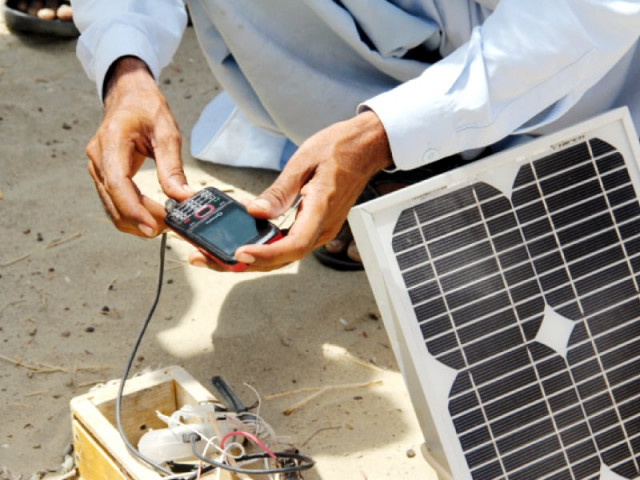Making do: The desert sun giveth and the desert sun taketh away
People of the white desert use solar panels to charge their phones.

Mir Hassan Rajar and many others go to other villages to charge their phones as the residents have purchased solar plates. Various small solar plates hang in the autaq [guest houses] in different villages, with four or five cell phones being plugged into each of them. PHOTO: AYESHA MIR/EXPRESS
A man stands on top of a large dune in the white desert, shouting into the phone in his hand. "Haane range men aahyaan. Haane phone kar [Now I am in range. Please call me]." He was speaking to someone in Karachi and wanted them to call him back.
He stood nearly 300 metres from his village, located in the Khipro Taluka of the Sanghar district. Since mobile do not receive signals inside the village, the people have no other option but to climb the high dunes if they want to use their phones. The government may not be providing them with roads or electricity or schools but when it comes to the internet and phones, they have taken matters into their own hands.
"I go to nearby village, a 20-minute walk from here, to charge my phone," said Mir Hassan Rajar, who lives in Ali Jo Dar village. "They have purchased a solar plate and many people from nearby villages also go there to charge their phones."
Various small solar plates hang in the autaq [guest houses] in different villages, with four or five cell phones being plugged into each of them. "A few of the people that live on the high dunes that receive mobile signals have opened public call offices (PCO)," said herdsman Abdul Gaffar, carefully putting his phone back inside his pocket after switching it off; there is no need of wasting precious battery once he climbs down from the dune and the signals disappear. The PCOs charge Rs5 per minute for outgoing calls but incoming calls are free.
"All of us know each other's phone numbers," he said with pride. "In case of an emergency, our relatives either phone us on the PCO number or on the numbers of nearby people living on the dunes. Soon after getting the message, we switch our phones on and climb a dune to call them back."
Ahmed Ali Rajar, a man who earns his livelihood through livestock, bought a small solar plate from the nearby town of Sanghar for Rs7,000. "Earlier, we would have to go on a camel or a donkey to convey a message in case of an emergency. Now, the world is on the tip of our fingers," he said. "We hear that the chief minister and other people in the government claim on radio that solar power projects to generate electricity will start soon. This location in the desert will be ideal for this purpose because of the heat. If we can do it on a smaller level, then why can't the government do it?"
The desert's only school
A veterinary doctor, Abdul Wahid Panhwar, is appointed to look after the Rangers camels, the only transportation source for the security agency in the desert. Panhwar also works as the principal of the Mian Mohammad Yousuf Rangers Public School in Saeedao.
The school is being run by 50 Wing of the Sindh Rangers for the last six years with the help of the Sindh Education Foundation, where some students have cell phones in their bags. "There is a mobile tower here and you can access the internet on our phones," he said with a smile, adding that 200 students are enrolled in the school, out of whom 33 are girls. "This is the only functioning school in the area. The school starts at 8am and runs till 4pm because students coming from other villages cannot travel in the desert at noon," he said.
Panhwar said that the school provides free education and people living further away also want to enroll their children but it is not possible as the school does not have an accommodation facility. "We have also started computer classes and most of the students can use internet on their phones," he revealed. "The entire desert lacks basic facilities but people have managed to connect themselves with the rest of the world through mobile phones."
Published in The Express Tribune, May 18th, 2014.



















COMMENTS
Comments are moderated and generally will be posted if they are on-topic and not abusive.
For more information, please see our Comments FAQ